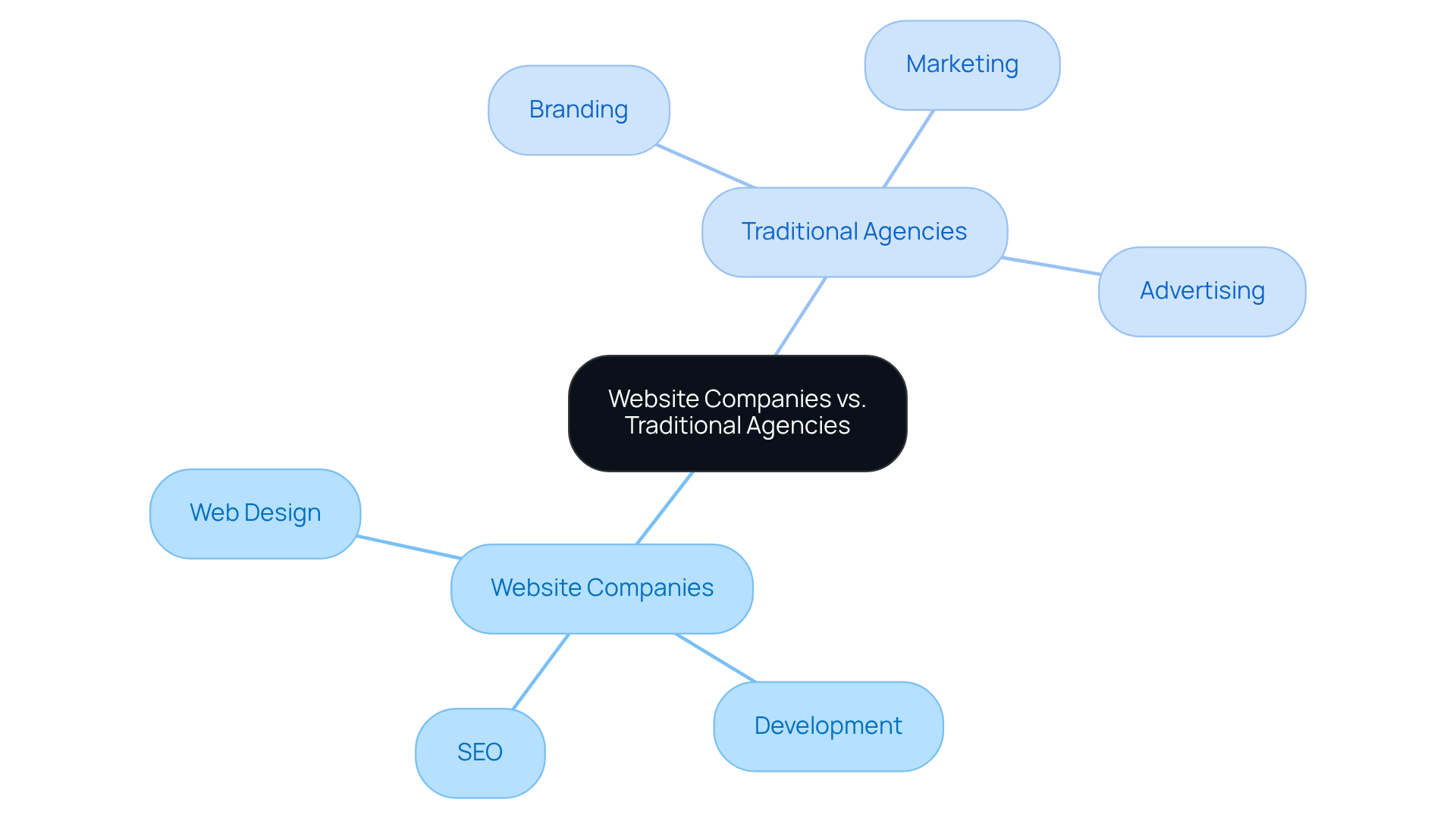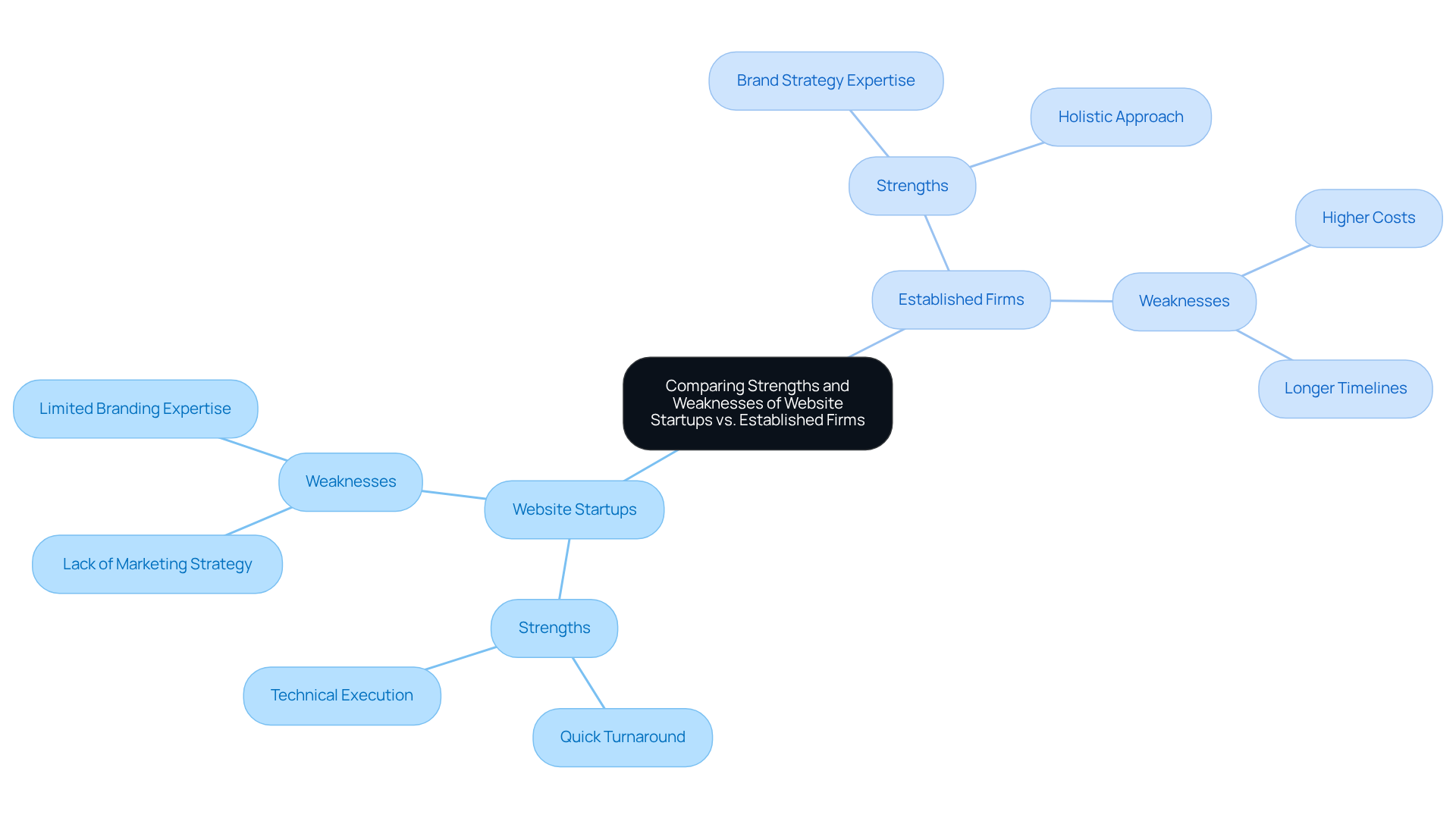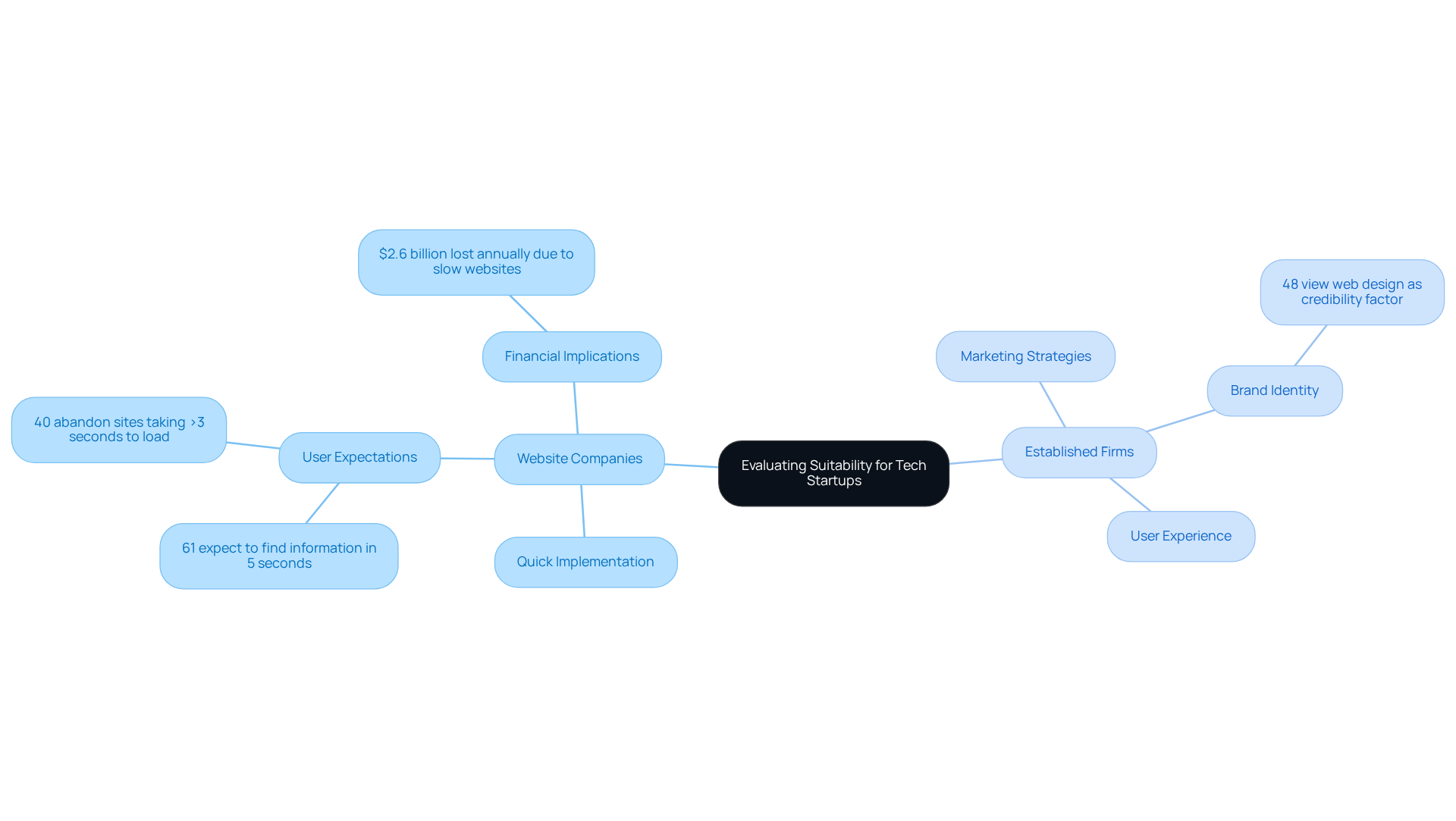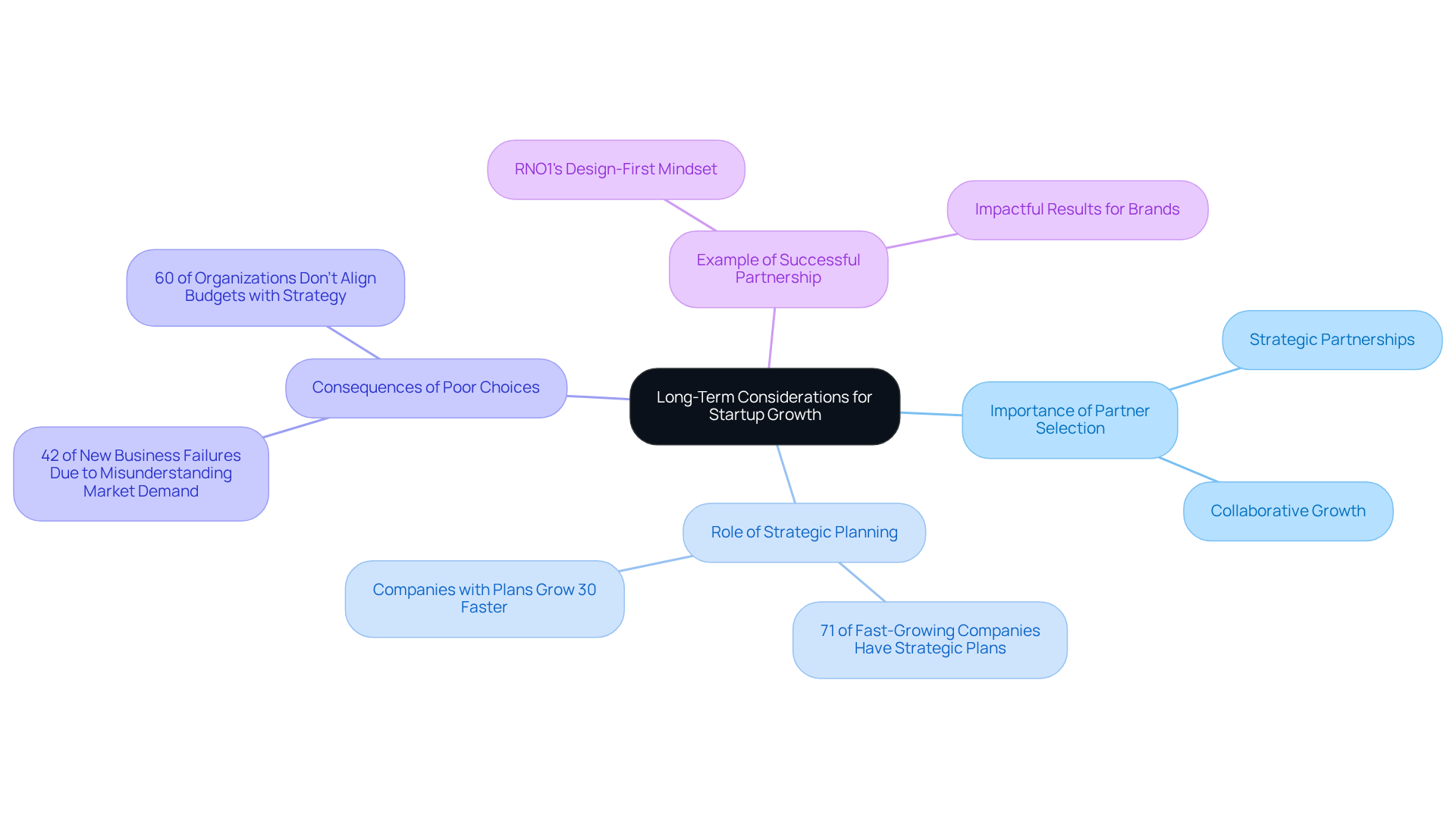Overview
In the journey of building a startup, many founders face a common dilemma: choosing between website companies and traditional agencies. This decision is not just about services; it’s about the heart of your brand and its future. Website companies often shine in technical execution and quick implementation, which can feel like a lifeline when you're eager to launch. However, traditional agencies bring invaluable branding and marketing strategies that are essential for long-term growth. It's crucial to recognize that each option has its strengths and weaknesses, and understanding these can be overwhelming.
The implications of this choice can weigh heavily on your shoulders. You might find yourself questioning whether to prioritize immediate results or invest in a more comprehensive strategy that nurtures your brand's identity over time. This is where the importance of aligning your choice with your startup’s immediate needs and strategic goals becomes clear.
As you navigate this decision, remember that you are not alone. Many founders have walked this path and faced similar challenges. By reflecting on your unique vision and values, you can find a solution that resonates with your aspirations. Whether you lean towards the swift execution of a website company or the strategic depth of a traditional agency, the key is to choose what feels right for you and your startup's journey.
Introduction
In today's increasingly digital world, startup founders often face a pivotal choice: should they partner with website companies or traditional agencies? This decision can significantly shape the trajectory of their business. Website companies are known for their technical execution and rapid deployment, which can be enticing. However, traditional agencies bring a holistic approach to branding and marketing, nurturing long-term growth that many startups desperately need. This dichotomy raises an important question: how can founders navigate the strengths and weaknesses of each option to ensure their business not only survives but thrives in a competitive landscape?
It's essential to recognize the weight of this decision. Many founders feel overwhelmed, torn between the immediate benefits of quick solutions and the desire for a comprehensive strategy that fosters lasting success. This tension can lead to anxiety, as the stakes are high and the path forward is often unclear. But remember, you are not alone in this journey.
The good news is that there is a way to approach this choice with confidence. By understanding your specific needs and goals, you can make a decision that aligns with your vision for the future. Take a moment to reflect on what truly matters for your startup's growth. Embrace the support and expertise available to you, and consider how a nurturing partnership can help you navigate these waters. Together, we can ensure that your startup not only survives but flourishes.
Defining Website Companies and Traditional Agencies
In today's digital landscape, many small businesses struggle to establish a strong online presence. Website companies primarily focus on , often emphasizing technical aspects like coding, hosting, and performance enhancement. Website companies may offer services such as web design, development, and SEO, catering to businesses that seek a robust online identity without delving deeply into branding services. However, this can leave a gap in how these businesses connect with their audience on a more personal level.
On the other hand, conventional firms provide a broader spectrum of services, including branding, marketing, and advertising. They often craft comprehensive strategies that integrate various channels to enhance brand identity and foster customer engagement. By adopting a more holistic approach, conventional firms emphasize long-term brand growth, nurturing relationships rather than just focusing on the technicalities of an online presence.
Current statistics reveal that as of 2023, 73% of small businesses in the U.S. have an online platform, underscoring the essential role of digital presence in today’s market. The digital advertising industry is projected to reach a market size of $20.7 billion, reflecting the increasing demand for integrated marketing solutions. Furthermore, the marketing sector is expected to grow to $769.9 billion by 2024, highlighting the ongoing relevance of established firms in the marketplace. This shift suggests that while online firms are vital for creating a digital footprint, conventional organizations play a crucial role in developing cohesive branding strategies that resonate with consumers across various platforms.
As we navigate this evolving landscape, it’s essential for tech startup founders to recognize the value of combining technical expertise with comprehensive branding strategies. By partnering with firms that understand both realms, businesses can cultivate a meaningful connection with their audience, ensuring they not only exist online but thrive within their communities.

Comparing Strengths and Weaknesses
In the fast-paced world of tech startups, many founders find themselves facing a significant challenge: while website companies often excel in technical execution, delivering quick turnaround times and specialized web development skills, they may fall short in offering the broader marketing and branding strategies that are crucial for long-term success. This gap can be disheartening, especially when considering that 70% of users abandon their purchases due to a lackluster user experience. It underscores the importance of effective design and branding—areas where established firms typically shine.
On the other hand, established firms offer invaluable expertise in brand strategy and market positioning, which can be essential for new businesses striving to carve out a strong identity. They often present a holistic approach that encompasses branding, UX design, and performance marketing. However, this comprehensive service can come at a significant cost, with project timelines stretching from 15 to 40 weeks for more complex projects. For new businesses that require swift implementation, this can feel like an overwhelming hurdle.
Moreover, it's alarming to note that 40% of users will move on to a different search result if the previous one was not mobile-friendly. This highlights the critical need for mobile optimization in web design. A poignant example can be seen in the case study of EcoFoil, which, after modifying their homepage layout, experienced an 86% increase in purchases. This clearly demonstrates how thoughtful design can profoundly impact user engagement and conversion rates.
As a startup founder, it’s essential to weigh these factors carefully. While website companies can provide prompt solutions, conventional organizations may offer the . Jared Schwitzke emphasizes that RNO1's design-first mindset leads to impactful outcomes, reinforcing the notion that effective design is not just beneficial but essential for new ventures. Ultimately, the choice between these agency types should align with your company's specific objectives and growth strategy, ensuring that you feel supported every step of the way.

Evaluating Suitability for Tech Startups
For technology new ventures, website companies often present a more suitable choice for those who prioritize quick implementation and technical capabilities. These firms shine in swiftly establishing a digital presence, allowing startups to effectively test their products and services in the market.
It's concerning to note that:
- 61% of internet users expect to find what they need within just five seconds of arriving on a site, highlighting the critical importance of rapid and effective launches.
- 40% of internet users have reported abandoning a website if it takes more than three seconds to load.
This can lead to a staggering $2.6 billion in lost sales annually for retailers, emphasizing the financial implications of website performance.
On the other hand, established firms are better positioned for new businesses aiming to cultivate a strong brand identity and implement comprehensive marketing strategies. Their expertise in performance marketing and user experience (UX) design plays a vital role in helping tech companies stand out in a competitive landscape.
With 48% of users viewing as a key factor in establishing a business's credibility, the influence of traditional firms on a new company's online presence is significant.
Ultimately, the decision rests on whether the company's immediate focus is on technical execution or long-term brand development. Founders should carefully consider their priorities, as the right choice can profoundly affect their journey in the fast-paced tech environment.
Remember, you're not alone in navigating these choices; seeking guidance can make all the difference in setting your startup on the right path.

Long-Term Considerations for Startup Growth
For new businesses aiming for sustainable growth, selecting the right firm is crucial. Many website companies offer essential technical support and maintenance, but they often overlook the strategic insight necessary for brand evolution. This can be disheartening for founders who seek guidance in a rapidly changing market. Conventional firms, however, shine in delivering comprehensive branding and marketing strategies, enabling new businesses to adeptly navigate shifts in consumer behavior and market dynamics. This adaptability is vital; as ventures expand, they require partners who can evolve alongside them, ensuring their brand remains relevant and competitive.
Consider this: 71% of fast-growing companies have strategic plans, business plans, or similar long-term planning tools. This statistic underscores the importance of having a clear strategic direction from your collaborators. On the flip side, choosing the wrong representatives can have serious repercussions; in fact, 42% of new business failures stem from a misunderstanding of market demand. Thus, the agency you select plays a significant role in shaping your startup's path, making it a .
As Jared Schwitzke wisely noted, RNO1's design-first mindset and impressive results exemplify the kind of strategic partnership that can truly drive growth. With RNO1 by your side, you can feel confident in navigating the complexities of your journey, knowing you have a partner who understands your vision and is committed to helping you thrive.

Conclusion
In the competitive landscape of tech startups, the choice between website companies and traditional agencies can feel overwhelming. This decision is pivotal for establishing a successful online presence. Website companies excel in technical execution, providing rapid solutions that cater to immediate needs. On the other hand, traditional agencies offer a holistic approach to branding and marketing, fostering long-term growth. For founders aiming not just to launch their products but also to build lasting relationships with their audience, understanding these differences is essential.
As we reflect on this discussion, we recognize the strengths and weaknesses of each type of firm. Website companies are adept at delivering quick and efficient web solutions, which are crucial for startups needing to establish their digital footprint swiftly. Conversely, traditional agencies provide strategic depth, essential for navigating market complexities and ensuring brand relevance. The statistics remind us of the importance of user experience and mobile optimization, emphasizing that the right choice can significantly impact a startup's success trajectory.
Ultimately, your decision should align with your startup's immediate goals and long-term vision. By carefully evaluating the capabilities of website companies and traditional agencies, you can make informed choices that not only meet your current needs but also set the stage for sustainable growth. Embracing a strategic partnership that balances technical prowess with comprehensive branding can empower your startup to thrive in an ever-evolving digital landscape. This approach ensures that you resonate with consumers and remain competitive, nurturing your vision and aspirations as you embark on this exciting journey.
Frequently Asked Questions
What is the primary focus of website companies?
Website companies primarily focus on developing and maintaining online platforms, emphasizing technical aspects such as coding, hosting, and performance enhancement. They offer services like web design, development, and SEO.
How do traditional agencies differ from website companies?
Traditional agencies provide a broader range of services, including branding, marketing, and advertising. They craft comprehensive strategies that enhance brand identity and foster customer engagement, focusing on long-term brand growth rather than just technical online presence.
What percentage of small businesses in the U.S. have an online platform as of 2023?
As of 2023, 73% of small businesses in the U.S. have an online platform.
What is the projected market size of the digital advertising industry?
The digital advertising industry is projected to reach a market size of $20.7 billion.
How is the marketing sector expected to grow by 2024?
The marketing sector is expected to grow to $769.9 billion by 2024.
Why is it important for tech startup founders to combine technical expertise with branding strategies?
It is essential for tech startup founders to combine technical expertise with comprehensive branding strategies to cultivate meaningful connections with their audience, ensuring they not only exist online but also thrive within their communities.




